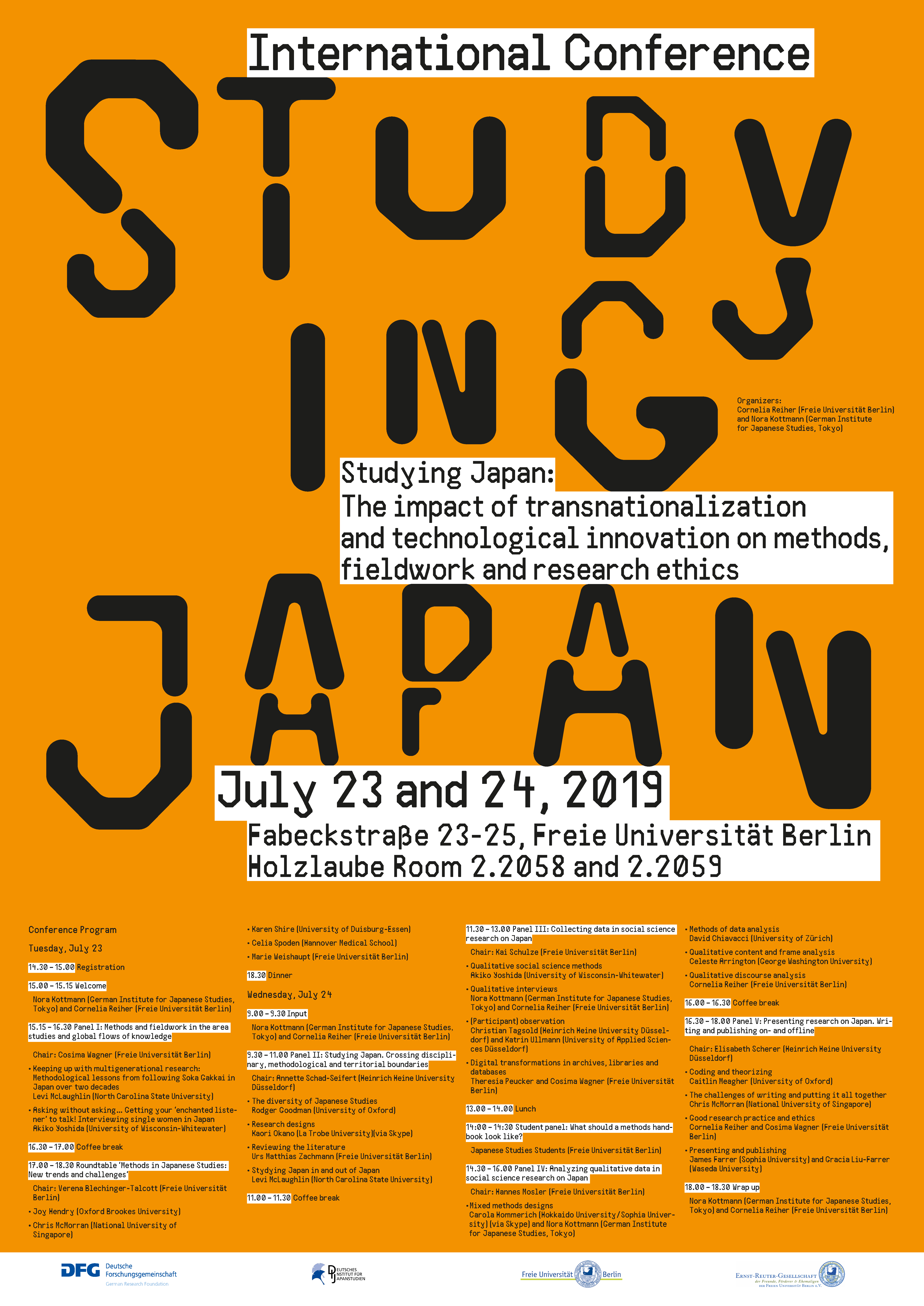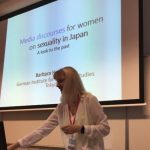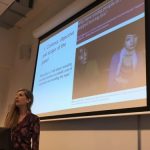Events and Activities
The DIJ at this year’s ICAS 11
At this year’s ICAS 11 conference in Leiden, Netherlands, the DIJ was represented by papers given by Barbara Holthus, Hanno Jentzsch, and Nora Kottmann. The Max-Weber Foundation also featured a book table, with numerous publications by the DIJ on display.
For more on this, see this report (in German).
Wielding Toxic Discourse: Insanity in the Nuclear Narratives of Chernobyl and Fukushima
Environmental scholar Lawrence Buell defined toxic discourse as a mode of writing that expresses “anxiety arising from a perceived threat of environmental hazard” (2003, 30-31). Fictional works from the Chernobyl and Fukushima nuclear accidents feature characters who appear to be mentally unstable because of this anxiety. Rather than their insanity discrediting them in the eyes of the nuclear industry, this presentation draws inspiration from Buell to consider how insanity can be used by victims of nuclear disasters to claim authority through toxic discourse by crafting narratives of resistance. One of the most controversial images stemming from nuclear disasters is of people who remain in highly irradiated areas unfit for human habitation. In novels by Kimura Yūsuke (Sacred Cesium Ground and Isa’s Deluge) and Alina Bronsky (Baba Dunja’s Last Love), the so-called insanity of these characters allows them to comment critically on the postdisaster situation, specifically the evaluation of risk and the bankruptcy of credibility. They provide insightful voices of resistance to the narratives of containment and safety perpetuated by the government and nuclear industry. The presentation ends with a consideration of actual residents in contaminated zones in Kamanaka Hitomi’s documentary Little Voices from Fukushima.
Speaker:
Rachel DiNitto, University of Oregon
The Politics of Migration in Japan

Over the last ten years the reported number of migrant workers in Japan has more than tripled, reaching almost 1.5 million in 2018. This unprecedented high number of foreigners migrating to work and live in Japan requires policy makers and academics to understand what is happening, why and how. We will take up the issue from the perspective of political science.
What do political parties have to say about the issue? What are their policy proposals, who is pushing them, and how high does immigration rank on the respective political agendas?
Shrinking but Happy? Investigating the Interplay of Social and Individual-Level Predictors of Well-Being in Rural Japanese Communities
Rural communities in Japan have been facing accelerating structural and demographic decline in recent decades. Yet, there is limited evidence on how these challenges impact communities and the quality of life of their inhabitants in Japan. Much of the available international data shows that rural municipalities report higher subjective well-being than urban areas despite being affected by greater structural decline in objective well-being indices.
This presentation will introduce a comprehensive, multidimensional approach to well-being, sensitive to individual and ‘Japanese’ constructions of happiness, and provide tentative insights into well-being in the rural Japanese town of Aso, Kumamoto Prefecture, which is average in terms of its demographic and economic situation.
Speaker:
Dionyssios Askitis, University of Vienna
Renewable Energy in Germany and Japan – Prospects for the Citizen Energy Movement
Citizen energy, known as “Bürgerenergie”, forms a major pillar of the transition to renewable energies (RE) in Germany. From as early as the 1990s German citizens pioneered in in solar and wind power or biomass energy projects and invested into RE as individual households, companies or as members within more than 900 energy cooperatives. Similarly, though less known, Japan as well has a long-established vibrant citizen energy movement, also referred to as “community power”. While initially focusing on building RE capacity, a growing number of citizen energy companies ventured into direct marketing of “green energy”.
The shift from a feed-in-tariff (FIT) to a feed-in-premium (FIP) and auction scheme, the institutional framework for grid integration, the deregulation of electricity markets, but also the changing social acceptance of RE and the ecological consciousness among the wider public present major challenges for citizen energy projects and their business models. Highlighting differences in the regulatory environment and public opinion, our speakers will be comparing the development of citizen energy in Germany and Japan. Despite differences, the citizen energy movement in both countries is presently challenged by tighter regulations for RE, growing local resistance to RE projects, and barriers to market integration. At the same time, direct markets for “green energy” are underdeveloped in Japan and, albeit more developed, contribute little to the expansion of renewables in Germany. Eiji Oishi will comment the discussion from a practitioner and business point of view.
Speakers:
Carsten Herbes, Nuertingen-Geislingen University, Germany
Jörg Raupach-Sumiya, Ritsumeikan University, Osaka
Eiji Oishi, Minna Denryoku, Tokyo
The Mountains Belong to Everybody? Conflicts about Recreational Forest Use in Austria and Japan
 Recreational outdoor sports, such as hiking, mountain biking, and trail running are enjoying increased popularity in Japan and worldwide. Proponents argue that these activities contribute to physical and mental health on the one hand and bring about economic and social benefits for rural areas on the other. At the same time there are concerns of over-use and environmental degradation. Focusing on mountain biking, Prof. Yuichiro Hirano and Prof. Wolfram Manzenreiter will be comparing the current situation in Austria and Japan and try to line out possible futures for sustainable outdoor tourism that benefits rural areas and protect the environment equally.
Recreational outdoor sports, such as hiking, mountain biking, and trail running are enjoying increased popularity in Japan and worldwide. Proponents argue that these activities contribute to physical and mental health on the one hand and bring about economic and social benefits for rural areas on the other. At the same time there are concerns of over-use and environmental degradation. Focusing on mountain biking, Prof. Yuichiro Hirano and Prof. Wolfram Manzenreiter will be comparing the current situation in Austria and Japan and try to line out possible futures for sustainable outdoor tourism that benefits rural areas and protect the environment equally.
Speakers:
Yuichiro Hirano, Forestry and Forest Products Research Institute, Tsukuba
Wolfram Manzenreiter, University of Vienna
Contemporary Japanese Theatre Workshop
This workshop investigates recent themes and issues in contemporary Japanese theatre. Themes that will be discussed include regional theatre, theatre and community, the role of the avantgarde and contemporary challenges. We consider some of the urgent issues that Japanese theatre is addressing today. Featuring a mix of presentations by senior scholars and new voices in the field, this workshop is open to everyone interested in theatre in the contemporary world. Presentations are in English.
Organizer:
Barbara Geilhorn
Studying Japan: The impact of transnationalization and technological innovation on methods, fieldwork and research ethics
 During two days an interdisciplinary group of renowned scholars from Australia, Europe, Singapore and the US will discuss new trends, opportunities and challenges that have changed the conduct of research on Japan. Starting out with a general discussion of research methods in area studies as well as social science research on Japan, the conference will discuss practices of collecting, analyzing and presenting data and findings individually, and the role and function of these practices within the whole research process. The conference focuses mainly on the methodological opportunities and challenges brought about by transnationalization as well as by technological innovations and digital transformation, with attention being paid to good research practice and ethics.
During two days an interdisciplinary group of renowned scholars from Australia, Europe, Singapore and the US will discuss new trends, opportunities and challenges that have changed the conduct of research on Japan. Starting out with a general discussion of research methods in area studies as well as social science research on Japan, the conference will discuss practices of collecting, analyzing and presenting data and findings individually, and the role and function of these practices within the whole research process. The conference focuses mainly on the methodological opportunities and challenges brought about by transnationalization as well as by technological innovations and digital transformation, with attention being paid to good research practice and ethics.
The conference is organized by Cornelia Reiher (Freie Universität Berlin) and Nora Kottmann (German Institute for Japanese Studies Tokyo) and jointly funded by the German Research Foundation (DFG), the German Institute for Japanese Studies (DIJ), the Freie Universität Berlin and the Ernst-Reuter-Gesellschaft.








 Open Access
Open Access
